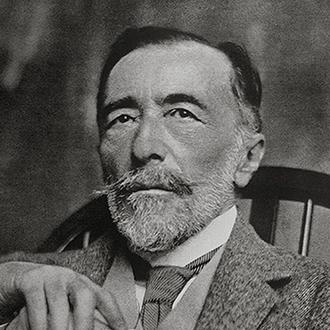Joseph Conrad (1857–1924) was a Polish-British novelist renowned for his profound explorations of human nature, colonialism and the moral dilemmas individuals face in extreme circumstances.
Conrad was born Józef Teodor Konrad Korzeniowski in Berdychiv (then part of the Russian Empire, now Ukraine) and grew up in a politically turbulent Poland under Russian rule. His father, Apollo Korzeniowski, was a writer and nationalist arrested and exiled for his opposition to Russian oppression. These early experiences of displacement and struggle profoundly influenced Conrad's later literary themes.
At 16, Conrad left Poland and travelled to France, where he embarked on a maritime career. In 1878, he joined the British Merchant Navy, gaining experience that would later serve as the basis for many of his novels. His travels took him to exotic places such as the Malay Archipelago and the Belgian Congo, giving him first-hand insight into colonial enterprises and the psychological strains of life at sea.
Joseph Conrad began his literary career relatively late, publishing his first novel, Almayer's Folly, in 1895 at the age of 37. Although English was his third language, he wrote in it, and his unique prose style combined elements of realism, romanticism, and early modernism. His works often focus on characters struggling with personal failure, moral ambiguity, and the darker aspects of human nature.
Notable works:
Heart of Darkness (1899)
One of Conrad's most famous and critically analysed works, Heart of Darkness, is a novella that follows Charles Marlow's journey up the Congo River to meet the enigmatic ivory trader Kurtz. The novel explores themes of imperialism, savagery versus civilisation and the psychological descent into darkness. Heart of Darkness has had a lasting cultural impact, influencing works such as Francis Ford Coppola's film Apocalypse Now (1979).
Lord Jim (1900)
This novel tells the story of Jim, a young British sailor who struggles with guilt and a search for redemption after abandoning a sinking ship. It is both an adventure story and a profound psychological study of shame, honour, and self-identity. Lord Jim remains one of Conrad's most influential works, exploring the consequences of a single moral failure.
Nostromo (1904)
Set in the fictional South American republic of Costaguana, Nostromo is a complex political novel examining wealth's corrupting power and imperial influence. The title character, an Italian sailor, is drawn into a conflict over a silver mine, which leads to his eventual downfall. Often cited as one of Conrad's most outstanding achievements, Nostromo influenced later writers such as F. Scott Fitzgerald and Graham Greene.
Conrad's other notable works include The Secret Agent (1907), a novel about anarchism and espionage in London, and Victory (1915), which explores existential themes of isolation and redemption.
Although he struggled financially for much of his career, Conrad eventually gained recognition and is now regarded as one of the most important English-language writers of the modern era.
Joseph Conrad died in 1924.

